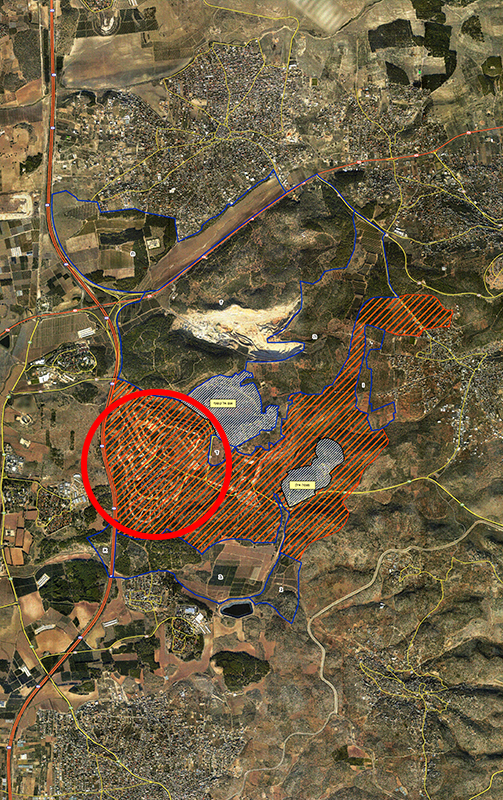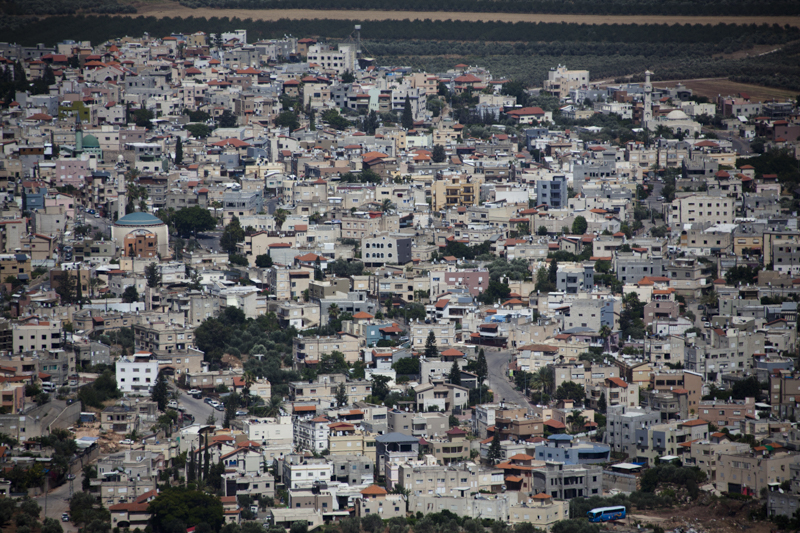Adalah to Interior Ministry: Reject Harish request to expand its jurisdictional boundaries
Adalah – The Legal Center for Arab Minority Rights in Israel sent a letter on 4 August 2016 to Israeli Interior Minister Aryeh Machluf Deri and Interior Ministry Director General Orna Hozman Bechor demanding that they reject a request from the Harish Local Council to expand its jurisdictional boundaries.
The letter, sent by Adalah on behalf of the Public Committee Against Home Demolitions and Land Expropriations in Wadi Ara, asked Interior Minister Deri as an alternate option to establish a regional committee that would examine the jurisdictional boundaries of all the local authorities in the Wadi Ara region of northern Israel.
Adalah Attorney Myssana Morany stressed in her letter that there is no justification for expanding the jurisdictional boundaries of Harish.
"The jurisdictional boundaries of the Harish Local Council constitute 7,108 dunams (approx. 1,756 acres), including some 4,000 existing housing units and construction permits for another 6,000 housing units. Nevertheless, only some 300 families, or about 1,200 residents, currently live in the community. Harish seeks to expand its jurisdictional boundaries to include an additional 13,410 dunams (3,314 acres) – an addition that would nearly double the council's current territory. The above figures reveal that Harish, given the community's small population, already has a large stock of housing units that have yet to be populated."
Harish residents sit outside the local council building. (Google Maps)
The expansion of Harish's jurisdictional boundaries would impact negatively upon the area's surrounding Arab towns and villages and their physical development.
"According to the data in the Harish request and its accompanying map, the sought-after boundaries of Harish would push directly up against built-up neighborhoods of the Arab communities of 'Ara-Ar'ara, Kafr Qara, Umm el-Qatif, Barta'a, Maysar, Baqa al-Gharbiya, and Dar el-Hanoun. If this request is approved, these Arab communities will be left without any developmental horizon – not even in the near future – and will not have any solution to the land and development crisis they have been facing for dozens of years," Adalah emphasized.
For example, Attorney Morany explained, 'Ara-Ar'ara, which now covers 9,183 dunams (2,270 acres) and had a population of 23,600 in 2014, is projected to have 40,000 residents by 2035. "'Ara-Ar'ara is now in the midst of formulating a long-term development plan for 2035 that would likely require alterations and expansion of its existing jurisdictional boundaries. A request to do so was filed with the Interior Ministry in 2015. Area H and Area Z (2,465 dunams or 609 acres and 5,788 dunams or 1,430 acres, respectively), now sought by Harish, are abutting 'Ara-Ar'ara's jurisdictional boundaries and transferring them to Harish would block 'Ara-Ar'ara's development options to the west and would endanger the community's long-term development plan."

Map illustrating the current inhabited area of Harish (circled in red) and request land expansion (outlined in blue) in relation to neighboring Arab communities. (Map courtesy of Israeli Ministry of Construction and Housing)
Adalah's letter detailed similar problems faced by the Arab community of Kafr Qara.
"Kafr Qara now sits on 7,811 dunams (1,930 acres) of land and in 2014 it had 17,400 residents. Its population is expected to increase to 30,000 by 2030. The Kafr Qara local authority and the planning administration are now in the midst of formulating a long-term development plan for 2040 that would likely require the expansion of the community's jurisdictional boundaries. A request to this effect was filed with the Interior Ministry. Area K, constituting 2,535 dunams (626 acres) and sought by Harish, is situated adjacent to Kafr Qara's boundaries and its residents have private and agricultural land plots in this area. Furthermore, in the framework of the updated National Outline Plan 35, the community has been authorized to expand both to the south and to the west – that is, into Area K. This land plot is intended for the community's natural expansion and serves as the primary land reserves for the expansion of Kafr Qara's boundaries and its future development."
Adalah emphasized that "if Harish's expansion request is not rejected in its early stages and if it is decided to establish a boundaries committee, we will demand that the committee have a wide mandate to examine the appropriate attribution of the sought-after land plots in accordance with the needs of all the local authorities in the area and based upon on considerations of distributive and corrective justice."
Attorney Morany argued that historically, the jurisdictional boundaries of Arab communities have been dramatically reduced in size since the establishment of the State of Israel in order to advance a deliberate state policy of Judaization in the Triangle area of the country.

Land and housing shortages are rampant in Arab communities in Israel. (Mati Milstein/Adalah)
"The map of local authorities was drawn up primarily in the 1950s and reflects an Israeli societal power structure based on ethnic separation. This map was drawn up in a manner promoting Jewish national control over land and exclusion of Arabs on an ethnic basis… Discrimination in land distribution of this sort has multi-generational implications and, indeed, we can see today the clear connection between the lack of land available for construction and development in Arab communities and the low socio-economic status of these communities."
From 2010-2013, Adalah together with the Arab Center for Alternative Planning (ACAP), sent numerous letters and objections to planning committees and filed cases to court to try to prevent the establishment of Harish, as a city designated solely for ultra-Orthodox Jews in the heart of Arab Wadi Ara. The main argument of the organizations was that the building of Harish would substantially block the development of neighboring and surrounding Arab communities, which urgently needed to expand their boundaries due to natural growth and development needs.
Adalah therefore demands that Interior Ministry Deri reject outright the request by Harish to expand its jurisdictional boundaries.
READ: Adalah's Letter to Israeli Interior Minister Aryeh Machluf Deri (Hebrew)
MAP: High-resolution map detailing Harish expansion request (Hebrew)
Related Press Releases:
- Adalah to AG: Freeze Demolition Orders against Arab Homes in the Triangle and Wadi Ara in Central Israel, and Resolve Severe Housing Shortages for Arab Citizens
- 2,300 new homes for ultra-Orthodox Jews in Arab Wadi ‘Ara
- Hearing held on Objection to Wadi ‘Ara Road Expansion
- Israeli government conditions housing budget for Arab communities on demolition of 'illegal' homes














